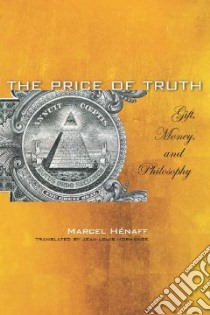- Libreria
- >
- Libri in lingua
- >
- Filosofia
- >
- Filosofia
The Price of Truth - 9780804760829
Un libro in lingua di Henaff Marcel, Morhange Jean louis (TRN), Feenberg Anne Dibon (COL) Marie edito da Stanford Univ Pr, 2010
- € 29.90
- Il prezzo è variabile in funzione del cambio della valuta d’origine
2002 Winner of the Grand Prize for Philosophy From the Academie Francaise and the Prize for Philosophy From the French Academy of Moral and Political Sciences
"A masterful work." Claude Levi-Strauss, Esprit Magazine (2004)
"Among the numerous studies of the `gift'---ceremonial gift-giving as distinct from exchange and from charity---Marcel Henaff's wide-ranging book is the best. It is one of the most important philosophical works of our time, full of inspiring ideas for anthropologists, sociologists, theologians, historians." Hans Joas, Max Weber Center, University of Erfurt
"Priceless truths about the price of truth." Michel Serres, of the Academie Francaise
Can exchange bring us together? Are there any physical or intangible goods that escape the logic of the marketplace? Is there a relationship between truth---the very purpose of philosophy---and money? Does truth have a price? Contrary to the Sophists, who demanded payment in return for their expertise, Socrates spoke for free. He had to do so, according to Aristotle, because knowledge cannot be measured---though he could accept gifts in return.
Today, we expect artists and intellectuals to be compensated for their labors. But is giving merely a form of exchange that was replaced by commerce? Anthropological investigation shows that the issue lies elsewhere: to give is to recognize in order to be recognized. It is to seal an alliance, to give oneself in what is given. Gifting raises further questions regarding the nature of sacrifice and the extent to which this last involves debt or grace.
In the Price of Truth, Henaff addresses these topics in turn, arguing that the relationship established by the gift lies at the core of the social bond. What emerges is a theory of culture and community formation that accounts for the structural patterns of traditional, political, and market-dominated societies. Crucial here is the idea that gifting and marketplace exchange are incommensurable. The latter, which involves money and contracts, has its own economic, political, and ethical necessity. The gift, though, always raises the ethical question of reciprocal recognition, a radical imperative to respect and be respected. Money has the power to threaten this requirement and break the bond that unites us. Why? To answer is to understand how the---priceless---price of truth is inseparable from that of dignity.
Informazioni bibliografiche
- Titolo del Libro in lingua: The Price of Truth
- Sottotitolo: Gift, Money, and Philosophy
- Autori : Henaff Marcel, Morhange Jean louis (TRN), Feenberg Anne Dibon (COL) Marie
- Editore: Stanford Univ Pr
- Collana: Stanford Univ Pr (Paperback)
- Data di Pubblicazione: 06 Ottobre '10
- Genere: SOCIAL SCIENCE
- Argomenti : Economic anthropology Gifts Philosophy Money Philosophy
- Pagine: 466
- ISBN-10: 0804760829
- EAN-13: 9780804760829


